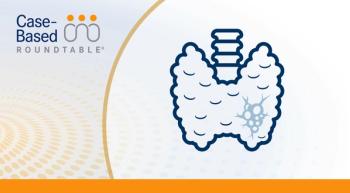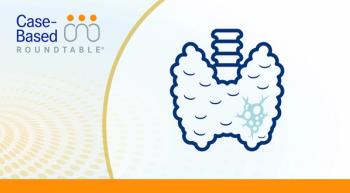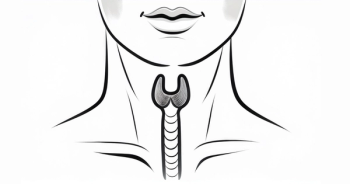
Defining Radioiodine-Refractory DTC
Lori Wirth, MD: Thinking about the definition of radioiodine-refractory disease is very important. This is especially important for the medical oncologist because medical oncologists don’t necessarily deal with that question on a regular basis. However, it is important before removing radioactive iodine from a patient’s treatment plan that we do know for sure that patients have iodine-refractory disease. There are several groups that have in their guidelines definitions of iodine-refractory disease, including the NCCN [National Comprehensive Cancer Network] Guidelines.
I turn to the American Thyroid Association [ATA] Guidelines for the definition that I use on a working basis for iodine-refractory disease. Basically, to sum it up, if patients have known structural disease that can be seen on CT [computed tomography] scans or MRI [magnetic resonance imaging], and there is no uptake in that tumor of radioactive iodine, that’s iodine-refractory disease. If there is uptake of radioactive iodine in some of the structural disease but not other structural disease, that also is iodine-refractory disease, according to the ATA Guidelines.
There are also patients with metastatic or local regionally recurrent differentiated thyroid cancer who take up radioactive iodine but after treatment dose of radioactive iodine still progress anyway. Those patients also are considered to have iodine-refractory disease.
We should consider not just did they get radioactive iodine in this arm, but what was the dose of radioactive iodine? Was it a treatment dose or was it a low dose, scan dose, of radioactive iodine? What did the whole-body radioactive iodine scan show afterward? What happened with the patient’s disease afterward? This helps us truly know if the patient meets the criteria for iodine-refractory disease.
The other thing I do, as a medical oncologist, is if there’s any lack of clarity at all or if I don’t have the data, I have a conversation with the patient’s endocrinologist, make sure that we’re all on the same page and that I understand the disease as a medical oncologist.
In terms of patients who shouldn’t get radioactive iodine, there are 2 thyroid cancer diagnoses that are de novo, not sensitive to radioactive iodine, and should not take radioactive iodine up. Radioactive iodine has no role in the treatment of those 2 cancers. Those 2 diagnoses are anaplastic, or undifferentiated thyroid cancer. Then the other diagnosis is medullary thyroid cancer.
Transcript edited for clarity.
Case: A 67-Year-Old Woman With Differentiated Thyroid Cancer
Initial presentation
- A 67-year-old woman presents with a painless “lump on her neck”
- PMH: unremarkable
- PE: palpable, non-tender solitary right-of-the midline neck mass; otherwise unremarkable
Clinical workup
- Labs: including TSH, anti-Tg antibodies WNL
- Ultrasound of the neck revealed a 3.6 cm suspicious right mass arising from the right thyroid; 3 suspicious supraclavicular largest 2.0 cm in size
- Ultrasound-guided FNAB of the thyroid mass and the largest lymph node confirmed papillary thyroid carcinoma
- Patient underwent total thyroidectomy with central compartment and right selective neck dissection
- Pathology: 3.6 cm papillary thyroid cancer arising in right lobe of thyroid, tall-cell features; extrathyroidal extension present; 2 of 6 positive central compartment lymph nodes, largest 1.6 cm, no extra nodal extension; 3 of 13 right lateral compartment involved nodes largest 2 cm, positive extra nodal extension
- StageT2N1MX; ECOG PS 0
Treatment and Follow-Up
- She was treated with radioactive iodine 150 millicuries
- Whole body scan showed uptake in neck only consistent with thyroid remnant
- Follow-up at 6 months TSH 0.1 mU/L; thyroglobulin 24 ng/mL
- Chest CT scan showed 10 small bilateral lung nodules largest 1.1 cm
- Follow-up CT neck and chest scan at 3 months was notable for a 1-2 mm growth in several lung nodules and 2 new distinct 8 mm lung nodules
- Lenvatinib 24 mg PO qDay was initiated









































